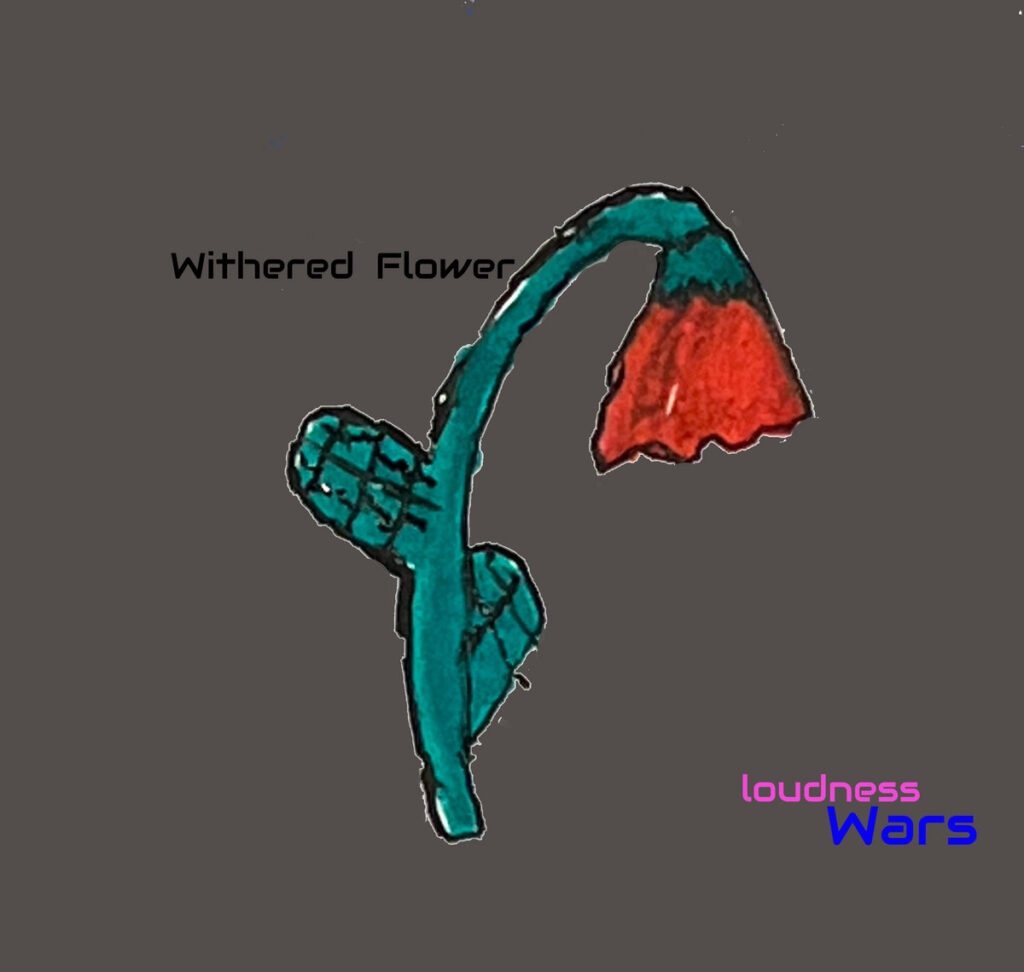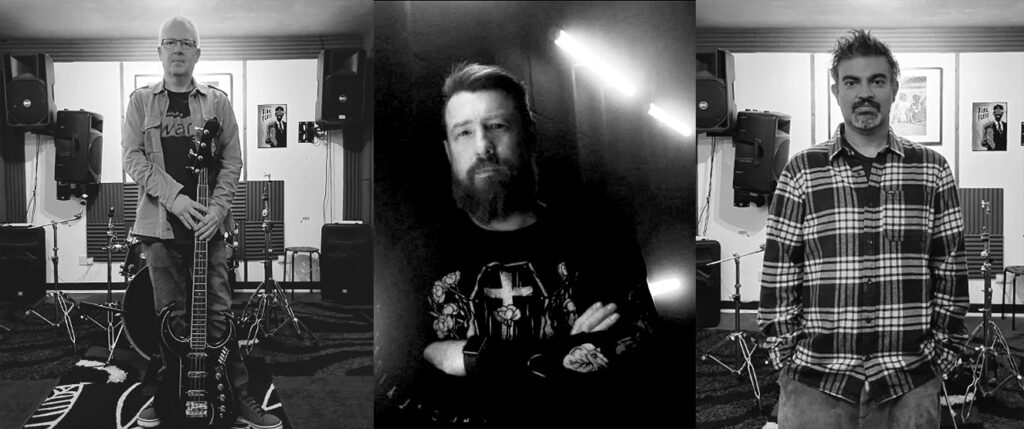UK-based trio Loudness Wars is exploring new territory musically and personally, as they shape a distinct sound within progressive rock. Formed by longtime friends and seasoned musicians Jerome, Rich, and Ian, the group combines their varied musical backgrounds in a way that feels natural. With their newest single, “Withered Flower,” featured on the Progotronics XLVI compilation, the band is eager to reach new listeners and showcase what they’ve been creating for their upcoming album.
Jerome, you’ve produced and recorded much of the band’s music. What inspired you to take on this role, and how has your background influenced your production style?
Jerome: I started playing guitar fairly late. Aged sixteen, I got my first part-time job working weekends and school holidays in a local record shop. I used my earnings to buy my first guitar around age 17. I then invested in a Tascam 4-track recorder soon after and became fascinated with recording demos and producing music. I carried on learning to record and evolve as home recording technology changed. I have always recorded the demos in every band I have been in.
The inspiration and fascination came from being a Prince fan; he produced and arranged all his albums. I didn’t want to narrow my musical tastes, so I tried to listen to as many genres of music, bands, and artists as possible. I was always listening to many varied types of songs and arrangements, from the Cure to Led Zep, GnR, Nirvana, Dr. Dre, etc. Consequently, my production style changes from track to track. I try to serve the song with what it needs and try not to overproduce or over-egg the pudding, so to speak. Basically, my influences are an amalgam of all the bands I enjoy.
Rich, as a guitarist at heart, how do you feel your experience with various bands has shaped your approach to bass in Loudness Wars?
Rich: Good question! I have always been more of a rhythm guitar player than a shredder. Hence, even though I should probably be concentrating on pounding out big single notes that reinforce Ian’s monster drumming, part of my brain can’t help but be drawn to the guitar chords in the song, and thinking about notes that might complement them. Playing in bands with varied instrumental lineups has helped me develop a feel for finding my own space within arrangements and, since moving to bass for this project, I have been revisiting some of my favourite classic rock records to see how acts with similar lineups made it work. As a result, I have a whole new appreciation for what John Paul Jones, Billy Cox and Andy Fraser brought to their respective bands.
Ian, you have a rich history as both a drummer and tour manager. How do those experiences inform your drumming style in this band?
Ian: I have played drums pretty much as long as I can remember. I did my first performance when I was ten and haven’t looked back since. John Bonham, Chad Smith and Louis Giannamore are my biggest heroes/influences but having been a tour manager has meant that I have seen literally hundreds of bands of all genres. This has allowed me to absorb a great deal of advice and ideas, as well as making a large number of friends. All of these things have given me a very rich tapestry to draw from. I am not what I would consider to be a particularly technical drummer but what I lack in chops I definitely make up for in enthusiasm.
Can you describe the chemistry among the three of you, especially given your diverse musical backgrounds?
Rich: I think we have all had similar musical journeys, having all played in bands since our teens. And despite us mostly working in different genres until now, we all enjoy dishing out the sort of scathing put-downs that make for good band banter!
How does that influence your songwriting process?
Jerome: I try to bring to the table songs that I hope Rich and Ian will enjoy. I tend to write in various styles and my songs can be influenced by my mood, the day I’ve had, or other music I’m listening to. Basically, however I’m feeling and whatever is in my head. This leads to having a lot of songs that don’t always make the cut because I might feel they don’t suit the band. These songs often never even get aired to the guys. Sometimes I think Ian might like a song which is more rock inspired, as I know he loves heavy metal. Hence, I might have that in mind when I’m riffing out something before I put words to it. Alternatively, I might write something and think Rich might dig this, and then send him a home demo MP3 to see what he thinks. Depending on the feedback, we may or may not go on to flesh these ideas out in rehearsal. Also, over the last two years we have worked on a whole bunch of songs which have since been binned as the band sound has evolved. To me, it is important to find a distinctive band sound, and I think we are really hitting the mark with the new track Withered Flower.

You’ve been writing and recording for two years. What has been the most challenging aspect of this process, and how have you navigated those challenges?
Rich: Given that we all have hectic schedules, the biggest obstacle is finding times where all three of us are available to rehearse and record. Rich and Ian frequently have other rehearsals and performances because they are also members of busy function bands. The fact that we currently all live around twenty miles from each other can create some logistical challenges too. As a consequence, we try to book longer sessions at our rehearsal space when we can. We also send a lot of demos and work-in-progress files back and forth online so that we can do some ‘homework’ between rehearsals.
Your upcoming song, “Withered Flower,” appears on the Progotronics XLVI compilation. Can you share the inspiration behind this track and its themes?
Jerome: The lyrics, I guess, are about nostalgia, loss, and the fleeting nature of love that fades with time. I try not to dwell too much on the themes of the songs though. I would much rather concentrate on the interplay between the lyrics and the melody, and see how they inspire one another as the song comes together. If you focus too much on the theme of a song, it can limit the listener’s freedom to interpret the lyrics in their own way.
What can listeners expect from your upcoming album in terms of musical style and lyrical content?
Jerome: We now have eleven or so tunes but, as we are still working on the album, they might not all make the final cut. Lyrically, common themes are emotions, including love, and interpersonal interactions. Whilst our aim is to give the record a cohesive feel, fusing rock and alt-indie sounds,this record will be as much of a surprise to us, when finished, as it will be for the listeners; everything has already massively evolved since its initial conception.
What does a typical rehearsal look like for you?
Ian: Typical rehearsals begin early on Sundays, with the customary banter and abuse as we strive to get everything set up as fast as possible.
Once we start playing, we try and divide our time between working on fleshing out new ideas and getting existing songs to a point where we can take them into the studio.
What role does each member play in the songwriting process? Do you have a specific method for creating songs together?
Jerome: Every member has complete authority over their respective roles. Ian has complete control over the drums, as does Rich on the bass. That said, no one’s ego is so fragile that they can’t take an occasional bit of constructive criticism! Drums, in my opinion, are the most important element that can make or break a song since they provide the energy and drive that ultimately molds the music. Ian always brings out the beast in our songs, whilst the bass plays a major role in the melody structure. The way Duran Duran’s bass lines used to carry those pop songs so effectively always captivated me. Overall, we each impart our own unique influence on the band’s sound, and we share equal songwriting credits.
Can you discuss any particular influences or inspirations that have shaped your music as a trio?
Rich: If there is one band that has influenced all three of us, I would probably say it’s Nirvana. Anyone who was into guitar music at the start of the 90’s would find it difficult to deny the huge impact that Nirvana had on the scene.
What are your expectations for your song on the Progotronics compilation?
Rich: We have not gone into this with any expectations, as such. We are just hoping for some interesting feedback, and interaction with potential fans.
How do you think it will resonate with listeners?
Jerome: We create music as a personal expression of ourselves, which is then filtered through the relationship still developing between us. The themes of relationships are timeless and ubiquitous so we hope the track might spark some discussions around what makes the song special or unique to the listener. We honestly hope, above all, that the music strikes a chord with the Progotronics subscribers and leads to them reaching out to us.
Looking ahead, what are your goals for Loudness Wars in the coming year, especially regarding live performances or new releases?
Ian: Our main focus is finishing the album but we would like to think we will, at some point soon, be putting the final touches to our live set so we can take Withered Flower out to UK audiences.
Stay in touch with Loudness Wars via Bandcamp.

